Meet the 2020 Pavel Molchanov Scholars
July 3, 2020The 2020 Pavel Molchanov Scholars discuss their summer internships amid a global pandemic. Interns and organizations have adapted to the new normal as the world navigates how to continue work with new guidelines and standards to protect public health. Funded by a $1 million gift from Pavel Molchanov, the program matches undergraduate students with environmental internships where students can supplement their academic work with experiential, professional training.
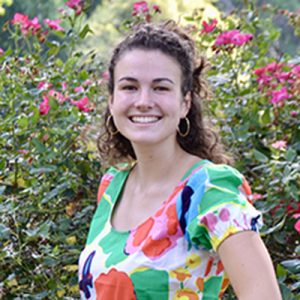 Emma Calhoun
Emma Calhoun
Hometown: Charlotte, NC
What type of career do you want to pursue and why?
I would like to pursue a master’s degree in Environmental Economics, which was the reasoning behind my spontaneous decision to tack on an Econ major at UNC. I am really interested in Ecosystem Service Valuations and how those models can be applied to fisheries management, biodiversity conservation and climate change. I think the economics aspect of environmental problems is one that we assume is working against our greener future, so I ultimately chose to pursue this specific area of study so I could do my part in shedding light on why economics really does favor things like conservation and reduced greenhouse emissions. The energy sector was never my area of expertise in school, so this summer I was excited to be paired with a company that was at the forefront of North Carolina’s solar development market and to learn about a different branch of climate change mitigation that I was unfamiliar with.
What specifically are you doing at Birdseye?
I’m working in Business Development as their “Solar Market Analyst Intern.” I have been doing a lot of research on energy markets in different states that Birdseye has interest in. I look at individual utilities and breakdown their annual sales, solar transactions and renewable generation goals. After my boss follows up with any questions or his own further research for some of the larger utilities, we call the companies to get a better understanding of their current and future involvement with solar, and to give them a rundown of Birdseye’s portfolio or interest in working with them.
What has been the most rewarding experience you have had at Birdseye?
Although Luke (my boss) is the one who does most of the work for the phone calls, the most satisfying part of the job has been receiving positive affirmations from the utilities we call. When they sound excited about solar and say they’re interested in talking about future plans, it feels like you’ve won the lottery!
What do you hope to accomplish at Birdseye?
I hope to have a better understanding of how the market for solar power has evolved within the past decade, and even the past year. Like I mentioned earlier, I have next to no experience with renewables, so I think I was able to accomplish my learning goal within the first few hours on the job! Luckily, I am constantly shifting gears with my tasks, and am looped in on most meetings so I’ve become acquainted with the ins and outs of a successful solar development company, which has been very cool. Another goal would be to meet my co-workers in person! Although that is unlikely, everyone has been so kind, welcoming and open to answering any questions I have!
Do you have advice for others pursuing your field of study?
My advice for those interested in Environmental Economics is to find a topic you’re really interested in and commit some personal time to research and really understand it. Not everything has to be academic, and I think this is a field that is super applicable to what is going on in our society, so getting a feel for how current researchers are applying their skills and creating mitigation strategies is really interesting. Another piece of advice would be to not discount “irrelevant” economic classes. Although the details of a marriage model or the overwhelming implications of a Keynesian graph seem inapplicable to environmental economics, they help you develop critical thinking and problem solving skills that are necessary for doing high-level research or making policy decisions. My final piece of advice would be to follow your heart in this field. I’ve had multiple people laugh at my major choice or try to steer me towards more conventional career paths. If it’s something you really want to do, then dive in and find where your passion lies. It will work out.
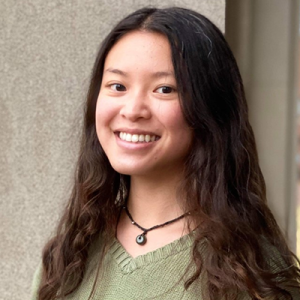 Natalie Gauger
Natalie Gauger
Hometown: Greensboro, NC
What type of career do you want to pursue and why?
I am want to work in the intersection of environmental stewardship and urban planning. Community service is also important to me, so engaging with local and regional systems to facilitate positive change is imperative. I am open to pursuing an urban planning degree or a law degree to impact decision making processes surrounding environmental issues.
What specifically are you doing at Southerly?
I conduct research for Southerly’s Gulf Coast correspondent, manage all social media accounts, create marketing deliverables, and compile information for internal assignments. My supervisor and I communicate regularly, providing updates and clarifying assignments.
What has been the most rewarding experience you have had at Southerly?
I strongly believe in Southerly’s mission. Access to environmental news is necessary for education and further action in mitigating the effects of our climate crisis. Seeing the stories that Southerly produces motivates me in my work for the environment, as well as reminds me of the communities who are most directly affected by these issues.
What do you hope to accomplish at Southerly?
I hope to contribute to Southerly’s ability to grow as an organization and sustain view engagement. By reaching more people, accurate information can be provided to those in news deserts and residents of the American South.
Do you have advice for others pursuing your field of study?
Find mentors and people who are currently working in your field. Seeking advice is critical in understanding what you hope to achieve and the path you decide to choose. Also reach out to people who are in different stages of their careers and in adjacent fields to yours.
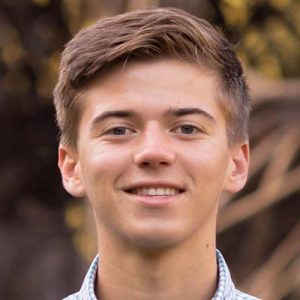 Noah Shaner
Noah Shaner
Hometown: Cary, NC
What type of career do you want to pursue and why?
I am really interested in exploring the intersection between business and sustainability. I think that sustainability currently is and will continue to be a competitive advantage for companies and I’m hoping to enter a field where I’m able to help businesses reduce their environmental footprint while also benefitting from the economic incentive brought upon by sustainability.
What specifically are you doing at Heelstone Renewables?
I’m helping with the Heelstone development team. The primary focus of this team is to develop new solar projects in various states. This process has many different steps, ranging from site selection and environmental screening to utility interconnection and the actual construction of the project. I’ve really enjoyed learning about the business side of renewable energy.
What has been the most rewarding experience you have had at Heelstone Renewables?
Studying environmental science has given me a great background in the environmental benefits of renewable energy, but to see the actual application of those principles in a business setting has been especially rewarding. I’ve learned so much about the entire process of creating a solar energy project from scratch and it’s very rewarding to see how Heelstone addresses various problems that may arise relating to the various stages of development.
What do you hope to accomplish at Heelstone Renewables?
I hope to leave Heelstone with a thorough understanding of the solar energy field and the various ways in which different businesses can benefit from sustainable solutions, such as renewable energy.
Do you have advice for others pursuing your field of study?
My best advice for others hoping to pursue an education or career relating to environmental science would be to explore the different ways you can apply your knowledge of or passion for the environment. There are so many roles and ways in which you can apply this background to help make the decision-making process for a business, government, or other organization more sustainable and environmentally-cognizant. These roles don’t have to involve careers that are explicitly sustainable, so keep an open mind when looking for opportunities to become involved.
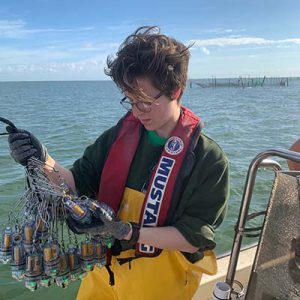 Rebecca Williams
Rebecca Williams
Hometown: Fairview, NC
What type of career do you want to pursue and why?
At this point, I am not sure exactly what path I will pursue within the discipline of environmental science and/or policy. I would like my work to have a direct impact on legislation regarding environmental issues, whether that be from work within government, non-profits, or another organization. I plan to continue to explore different career options in both research and policy as I pursue a Master’s degree (or some other form of higher education) and find a path with which my passion, skills, and interests most align.
What specifically are you doing at Don’t Waste Durham GreenToGo?
I am currently working with Don’t Waste Durham as the Research Utilization Intern. A lot of my work this summer has focused on research regarding the safety of reusables during the COVID-19 pandemic. I have also been a part of communications and projects involving larger reuse networks in an effort to encourage restrictive policy surrounding disposable single-use plastics and styrofoam. North Carolina is significantly behind other states when it comes to regulating single-use plastic bags, styrene products, and other disposables that have a direct impact on human health, so legislative efforts combating waste are extremely important.
What has been the most rewarding experience you have had at Don’t Waste Durham GreenToGo?
The most rewarding part of belonging to the Don’t Waste Durham team is having the opportunity to work with individuals who are equally passionate about protecting the environment on projects that generate tangible results. I am able to work on a handful of projects with professionals ranging from law experts to nonprofit leaders.
What do you hope to accomplish at Don’t Waste Durham GreenToGo?
Don’t Waste Durham is a small nonprofit taking on substantial environmental issues. My goal for my internship has been to do as much work as I can providing data and assistance necessary to push forward on legislative issues while also assisting with tasks regarding the smaller GreenToGo business (a reusable takeout container company encouraging a circular economy instead of typical disposable foodware that generates often-hazardous waste) that exists within the Don’t Waste Durham project scope.
Do you have advice for others pursuing your field of study?
Careers in environmentalism cover a large scope of fields from research scientists to policy makers to non-profit owners and anything in between. The climate change crisis take any form from ocean acidification to acts of environmental injustice, all of which need to be addressed. My advice to anyone looking to environmental careers would be to explore all avenues of work that environmentalism can take to find where your skills and interests can make the most impact.
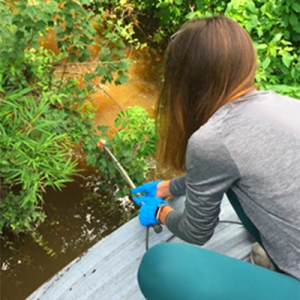 Amelia Woodall
Amelia Woodall
Hometown: Cornelius, NC
What type of career do you want to pursue and why?
I am a rising senior majoring in Environmental Studies with a double minor in GIS and Geography. Within my major, I am focusing on the “Population, Environment, and Development” concentration. I am still trying to figure out exactly what my post-graduate plans will look like, especially given the circumstances now surrounding COVID-19, but I would like to pursue something where I am able to use my GIS skills.
What specifically are you doing at Sound Rivers?
This summer at Sound Rivers, I am one of three Swim Guide interns. The Swim Guide program is an effort spanning the Neuse and Tar-Pamlico River Basins in North Carolina where the basin Riverkeepers, interns, and volunteers monitor water quality at various recreational sites, focusing on E. coli bacteria levels. The program runs from May through the end of August, months when paddling, fishing, swimming, and other forms of recreation are usually more popular. As an intern, I am responsible for running the Swim Guide program for the Tar-Pamlico River Basin. I coordinate with and train the site volunteers on how to properly collect the water samples from each site, manage the volunteers for each week of the program, perform E. coli tests on the water samples, then record and push out the data on the E. coli levels at each site to various media sources. When I publish the results each week, we compare the MPN level of E. coli at each site in the basin to the EPA MPN standard/regulation level for recreational sites. If a site is found to be over that level, which oftentimes is the case given the number of CAFO and agricultural sites nearby, then we suggest that people avoid those sites for the following week to prevent E. coli related sicknesses.
Alongside being the Tar-Pamlico Swim Guide intern, I have had the opportunity to work on some other projects such as mapping all of the stream crossings that would occur with the predicted construction path of the Atlantic Coast Pipeline in the Chowan, Roanoke, Neuse, and Tar-Pamlico Watersheds for NC Pipeline Watch volunteers and sampling at various CAFO sites in the Tar-Pamlico.
What has been the most rewarding experience you have had at Sound Rivers?
My most rewarding experience so far would probably be seeing the relationship that Sound Rivers has with its community. The Swim Guide program relies heavily on volunteer sampling efforts, as do other efforts that Sound Rivers is a part of as an organization. When my internship first began, we were unsure if we would be able to utilize volunteer help or not this summer. Even given these uncertainties with COVID-19, I have enjoyed the enthusiasm that our volunteers had earlier on and continue to have about wanting to help with sampling. We really value the help of volunteers and support from the locals in the Tar-Pamlico and Neuse River Basins, so seeing their continued positivity and desire to contribute to our work has been phenomenal.
What do you hope to accomplish at Sound Rivers?
Personally, I hope to narrow down my interests within my major. While being passionate about a variety of areas is fantastic on its own, I have always struggled with really focusing on a certain field. So far, I have been able to delve deeper into the realm of water quality and apply many things that I have learned from my courses at UNC while in the office or in the field. Within my internship, I hope to learn more about the world of non-profits and how they function within their communities. I also am enjoying continuing to learn more about how nearby agricultural practices (i.e. CAFOs – Concentrated Agricultural Feeding Operations) and other practices have an impact on water quality and environmental injustices.
Do you have advice for others pursuing your field of study?
The best piece of advice that I can offer is that if you are considering pursuing something in the environmental field, to keep your options open! There are so many careers that are environmentally focused and UNC has lots of great professors and resources who are more than happy to sit down with you and give suggestions about certain paths given your interests. Don’t be afraid to ask for guidance, especially if you feel overwhelmed with the many different fields of study within the environmental departments!
